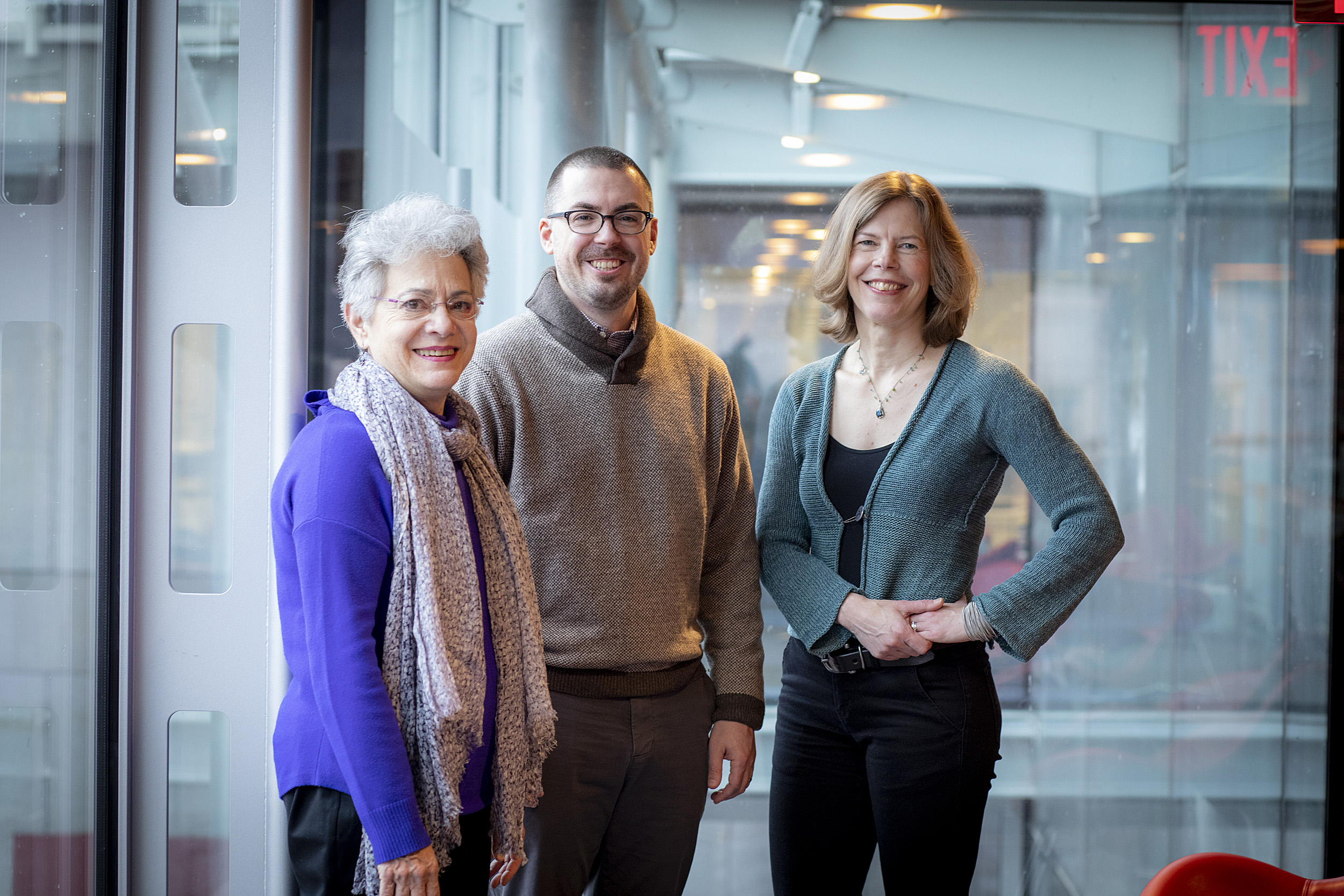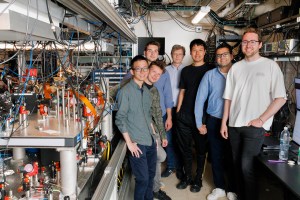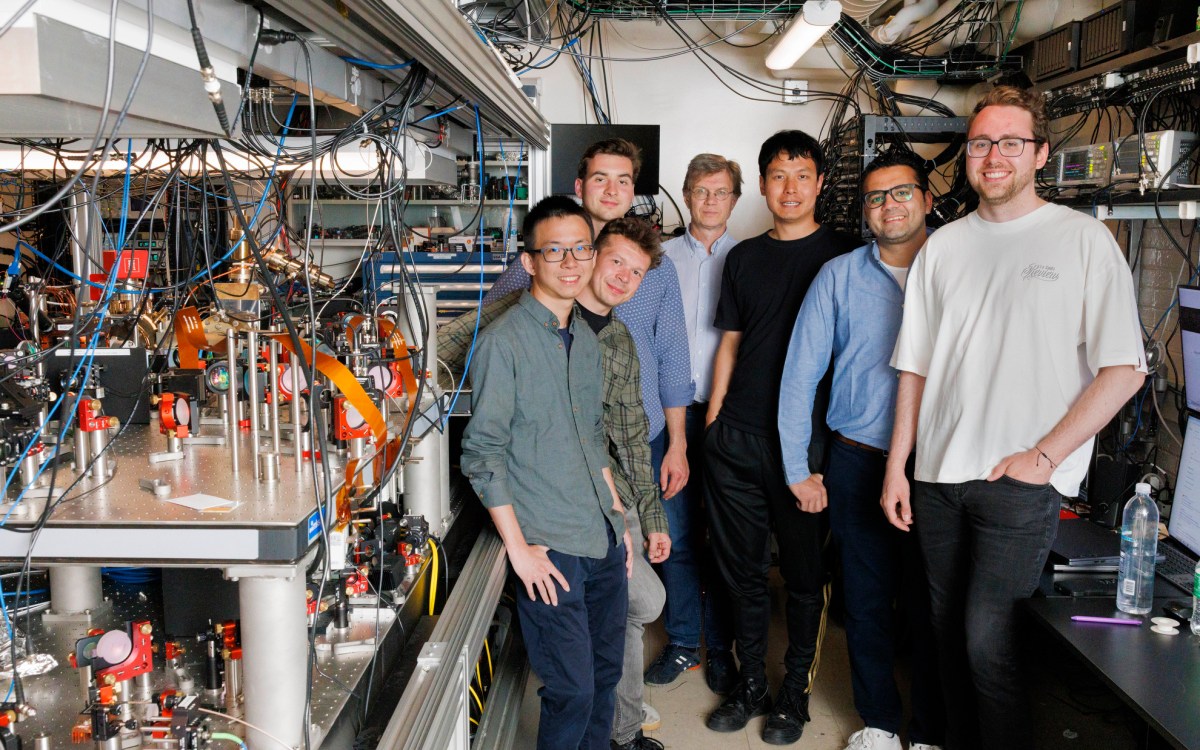
Barbara Grosz (from left), Jeff Behrend, and Allison Simmons, are part of an embedded EthiCS program that is the marriage of computer science and ethics in a group of courses at Harvard.
Rose Lincoln/Harvard file photo
Embedded EthiCS wins $150,000 grant
Program aims to make everyday technology more ethical
On Tuesday, Barbara J. Grosz, the Higgins Professor of Natural Sciences at the Harvard John A. Paulson School of Engineering and Applied Sciences (SEAS), was named a winner in the Responsible Computer Science Challenge, a $2.4 million competition run by some of the biggest names in tech and civil society: Omidyar Network, Mozilla, Schmidt Futures, and Craig Newmark Philanthropies.
The $150,000 grant Grosz received will support the Embedded EthiCS program. A collaborative undertaking of the computer science and philosophy faculties, Embedded EthiCS seeks to teach the next generation of computer scientists to design systems that are morally and socially responsible. Consistent with the collaboration showcased by the Embedded EthiCS program, Grosz’s proposal for the challenge was developed with Alison Simmons, the Samuel H. Wolcott Professor of Philosophy and interim chair of the Philosophy Department, as well as with other faculty and graduate students from the Computer Science and Philosophy departments who work on the program.
“Harvard is seeking to create a new generation of computer scientists who are focused on what software should and shouldn’t do as much as they are on what software can do,” said Simmons. “This award will allow us to further enhance the ongoing collaboration between the Computer Science and Philosophy departments through increased cross-learning and cross-teaching.”
Led by Grosz and Simmons since 2017, Embedded EthiCS makes ethical reasoning integral to Harvard’s computer science education with a distributed pedagogy that introduces ethics directly into courses across that curriculum. It works by embedding philosophers into courses to teach modules that explore ethical issues raised by course materials.
“Embedded EthiCS is a truly special feature of the Harvard computer science curriculum, and we are grateful to Barbara, Alison, and their team for developing it,” said Salil Vadhan, Vicky Joseph Professor of Computer Science and Applied Mathematics. “What makes it unique compared to efforts at other universities is that ethics modules are spread throughout our computer science offerings, rather than being confined to a single course about ethics in computing. This teaches our students to realize that there are societal and ethical implications of almost everything they will do as computer scientists, and to always evaluate solutions to technical problems along these axes along with traditional criteria such as computational efficiency.”
The success of the program can be tied directly to Grosz and Simmons’ leadership in addition to the dedicated computer science faculty and the extraordinary work and creativity of both computer science and philosophy graduate students. The award will enable the team to design better in-class exercises and assignments based on day-to-day, real-life tech challenges.
“This [award] underscores the importance of Harvard’s liberal arts and sciences education in our society, because systems should not be designed without taking societal norms and conditions into account.”
Barbara Grosz
“Embedded EthiCS has allowed the students in my class to think critically about matching markets and recommender systems, lifting up and shaping our conversation in a way that I couldn’t have managed by myself,” said David Parkes, George F. Colony Professor of Computer Science.
Embedded EthiCS has been a successful and popular pilot program at Harvard, and today’s award will help ensure its long-term success. The grant will help provide concrete activities and assignments that incorporate current technical concepts, data, and ethical issues that are salient to students and relevant to their future work in technology. It will also support the distribution of pedagogy across the curriculum, so that students in various courses can encounter diverse ethical issues and solutions.
“Seeing current, real-world examples makes a big difference, because students can dig deep into the conflicting values that always come with ethical questions,” said Radhika Nagpal, Fred Kavli Professor of Computer Science at SEAS. “Students can leverage the technical material they are in the process of learning and see how a technical solution has value implications. For example, in my robotics class, students work with robot hardware on an automated warehouse application, but they also see the technical limits of automation that only allow certain things to get automated. For the ethics lecture, we tackle the question, are we automating the right jobs? Are we actually making society a better place? And for whom?”
The award will also be used to add CS postdocs to the teaching lab in which Embedded EthiCS modules are generated and workshopped, increasing CS expertise there and enhancing the technical depth of the modules.
“By including computer science postdocs in the teaching lab team, this award will enhance the collaboration between computer science and philosophy,” said Stephen Chong, Gordon McKay Professor of Computer Science at SEAS. “I anticipate it will lead to the development of Embedded EthiCS modules with tighter integration of computer science content, and enable us to gather more real-world case studies. This can spur deeper engagement from the students as they think through the ethical and social implications of the course material.”
The challenge is an ambitious initiative to integrate ethics into undergraduate computer science curricula and pedagogy at U.S. colleges and universities. It fuels the conceptualization, development, and piloting of curricula that integrate ethics with computer science — bridging the sciences and humanities. The hope is that this coursework will not only be implemented, but also scaled to colleges and universities across the country and beyond. Students of computer science go on to be the next leaders and creators in the world, and must understand how code intersects with human behavior, privacy, safety, equality, and many other factors.
“This [award] underscores the importance of Harvard’s liberal arts and sciences education in our society, because systems should not be designed without taking societal norms and conditions into account,” said Grosz. “By linking together two different parts of the College’s curriculum, we are able to teach students of computer science how to think through the ethical and social implications of their computer systems’ design and implementation choices.”
Through its open-access repository, which will be further developed by this award, Embedded EthiCS will help other colleges and universities incorporate ethical reasoning activities into their courses, thus reaching a wide range of undergraduate students.
“I’m particularly excited by the opportunity … to make the Harvard Embedded EthiCS course modules openly available,” said Nagpal. “For my CS189 robotics class, we developed a module on robots and job automation, and I have many robotics colleagues in other universities who want to bring such material into their classrooms too.”







